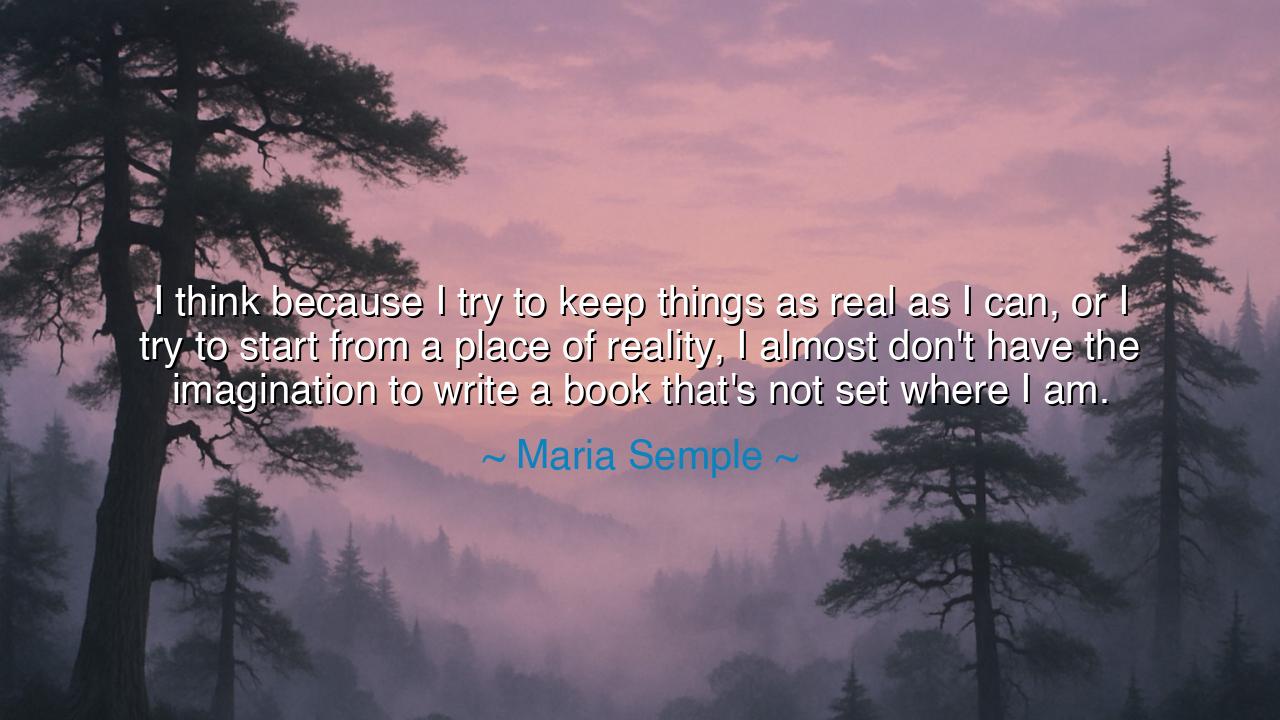
I think because I try to keep things as real as I can, or I try
I think because I try to keep things as real as I can, or I try to start from a place of reality, I almost don't have the imagination to write a book that's not set where I am.






O children of the earth, gather now and listen closely to the words of Maria Semple, for her insight into the nature of reality and imagination speaks to the heart of what it means to create. She said, "I think because I try to keep things as real as I can, or I try to start from a place of reality, I almost don't have the imagination to write a book that's not set where I am." In these words, Semple reveals a profound truth about the nature of writing—that even in the realm of fiction, the starting point must be grounded in reality. Imagination does not exist in a vacuum; it is shaped and guided by the world around us, by the places we inhabit and the experiences we live.
The writer, O children, is not just an observer of the world but a participant in it. To write from a place of reality is to acknowledge that the stories we tell are often reflections of our own lives, our own environment, and our own experiences. Semple’s words remind us that imagination does not operate in isolation; it is born from the very world we live in, from the places and people we encounter. To write a story set in a far-off land or in a world vastly different from our own may feel, to Semple, like an act of pretending, of departing too far from the world she knows. For her, writing is not an escape into something foreign, but a deepening into the familiar, an exploration of the world that is immediately available to her.
This connection between imagination and reality has been understood by great writers throughout the ages. Consider the example of the ancient Greeks, who grounded their epic tales not in fantastical worlds, but in human emotions and moral struggles that transcended time and place. Homer, in his Iliad and Odyssey, spoke of gods, but those gods were reflections of the human condition—the desire for power, love, vengeance, and redemption. The real world of ancient Greece, with its values and struggles, shaped the stories that Homer told, making them not just myths, but deep meditations on the nature of human life.
Likewise, Charles Dickens wrote of the realities of Victorian London, of its social inequalities, its bustling streets, and its suffering poor. Dickens’ imagination did not soar into distant, unreal worlds; it delved into the very heart of the city he knew, the lives of the people who lived there. The characters in his stories were products of the society that shaped him, and through his writing, he illuminated the truths of his time, showing us that fiction does not need to be set in strange or unknown places to be meaningful. It can, and often does, arise from the world we see around us—its darkness, its light, and everything in between.
Semple’s writing shares this deep connection to the world she knows. Her books, such as Where’d You Go, Bernadette, are set in places and situations she herself is familiar with, yet through her imagination, she brings these realities to life in ways that feel new and fresh. The characters in her novels may walk in the streets of Seattle, but their emotions, struggles, and desires are universal. They are reflections of us all—flawed, human, and yearning for connection. Through the lens of reality, Semple opens up a world of deep emotional truth, inviting us to see the mundane with the eyes of a creative spirit, allowing us to find beauty and meaning in the everyday.
The lesson, O children, is clear: Imagination does not exist in isolation; it is shaped by the real world. As Semple says, the stories we create are often rooted in the familiar, in the places we know best. The material world—our families, our cities, our daily experiences—becomes the foundation upon which our imagination can build. To create is not to escape reality, but to engage with it more deeply, to look beyond the surface and see the potential for stories, for truths, and for beauty in the world around us.
Consider the great visionaries of the past. Leonardo da Vinci observed the world around him, from the natural world to the human body, with a careful eye. His imagination did not lead him into fictional realms; it led him to understand and depict the real world in ways that had never been seen before. His art was not an escape but an exploration of the truths that lay hidden beneath the surface of everyday life. In this, Da Vinci shows us that imagination is a way of deepening our understanding of reality, not escaping it.
So, O children, take this wisdom to heart: The real world is the canvas upon which your imagination paints. You do not need to escape into distant worlds or create wholly imaginary realms in order to create meaning. The stories of your lives, the places you inhabit, and the people you encounter are enough to fuel your creativity. Imagination is not about fleeing reality—it is about seeing it more deeply, more clearly, and finding new meaning in the world as it is. Let your stories be grounded in the reality you know, and in doing so, you will discover the extraordinary within the ordinary.






AAdministratorAdministrator
Welcome, honored guests. Please leave a comment, we will respond soon